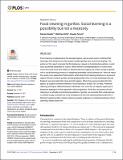Files in this item
Food cleaning in gorillas : social learning is a possibility but not a necessity
Item metadata
| dc.contributor.author | Neadle, Damien | |
| dc.contributor.author | Allritz, Matthias | |
| dc.contributor.author | Tennie, Claudio | |
| dc.date.accessioned | 2017-12-05T11:30:10Z | |
| dc.date.available | 2017-12-05T11:30:10Z | |
| dc.date.issued | 2017-12-04 | |
| dc.identifier | 251698133 | |
| dc.identifier | ab401372-b668-40a3-a689-5964eb4ae2e1 | |
| dc.identifier | 85037041774 | |
| dc.identifier | 000417033200017 | |
| dc.identifier.citation | Neadle , D , Allritz , M & Tennie , C 2017 , ' Food cleaning in gorillas : social learning is a possibility but not a necessity ' , PLoS One , vol. 12 , no. 12 , e0188866 . https://doi.org/10.1371/journal.pone.0188866 | en |
| dc.identifier.issn | 1932-6203 | |
| dc.identifier.other | RIS: urn:1A06E42CA0F1B0341FE873316D6203B4 | |
| dc.identifier.uri | https://hdl.handle.net/10023/12251 | |
| dc.description | Damien Neadle has received funding from the Economic and Social Research Council, under a full PhD Studentship ES/J50001X/1. Matthias Allritz has received funding from the European Research Council under the European Union’s Seventh Framework Programme (FP7/2007-2013) / ERC grant agreement n° 609819 (SOMICS). Claudio Tennie has received funding from the European Research Council under the European Union’s Horizon 2020 Programme (H2020-EU.1.1.) / ERC grant agreement n° 714658. | en |
| dc.description.abstract | Food cleaning is widespread in the animal kingdom, and a recent report confirmed that (amongst other behaviours) wild western lowland gorillas also show food cleaning. The authors of this report conclude that this behaviour, based on its distribution patterns, constitutes a potential candidate for culture. While different conceptualisations of culture exist, some more and some less reliant on behavioural form copying, all of them assign a special role to social learning processes in explaining potentially cultural behaviours. Here we report the results of an experiment that tested to what extent food cleaning behaviour in a group of captive Western lowland gorillas (Gorilla gorilla gorilla) relies on social learning processes. Subjects were provided with clean and dirty apples. When they were provided with dirty apples, all subjects showed evidence of food cleaning in at least 75% of trials. Preferred cleaning techniques differed between individuals, four out of five of subjects expressed a behaviour analogous to that reported in wild conspecifics. Given this occurrence of food cleaning in a culturally unconnected population of gorillas, we conclude that social learning is unlikely to play a central role in the emergence of the food cleaning behavioural form in Western lowland gorillas; instead, placing a greater emphasis on individual learning of food cleaning’s behavioural form. | |
| dc.format.extent | 16 | |
| dc.format.extent | 3827820 | |
| dc.language.iso | eng | |
| dc.relation.ispartof | PLoS One | en |
| dc.subject | BF Psychology | en |
| dc.subject | DAS | en |
| dc.subject.lcc | BF | en |
| dc.title | Food cleaning in gorillas : social learning is a possibility but not a necessity | en |
| dc.type | Journal article | en |
| dc.contributor.sponsor | European Research Council | en |
| dc.contributor.institution | University of St Andrews. School of Psychology and Neuroscience | en |
| dc.identifier.doi | 10.1371/journal.pone.0188866 | |
| dc.description.status | Peer reviewed | en |
| dc.identifier.grantnumber | 609819 | en |
This item appears in the following Collection(s)
Items in the St Andrews Research Repository are protected by copyright, with all rights reserved, unless otherwise indicated.

